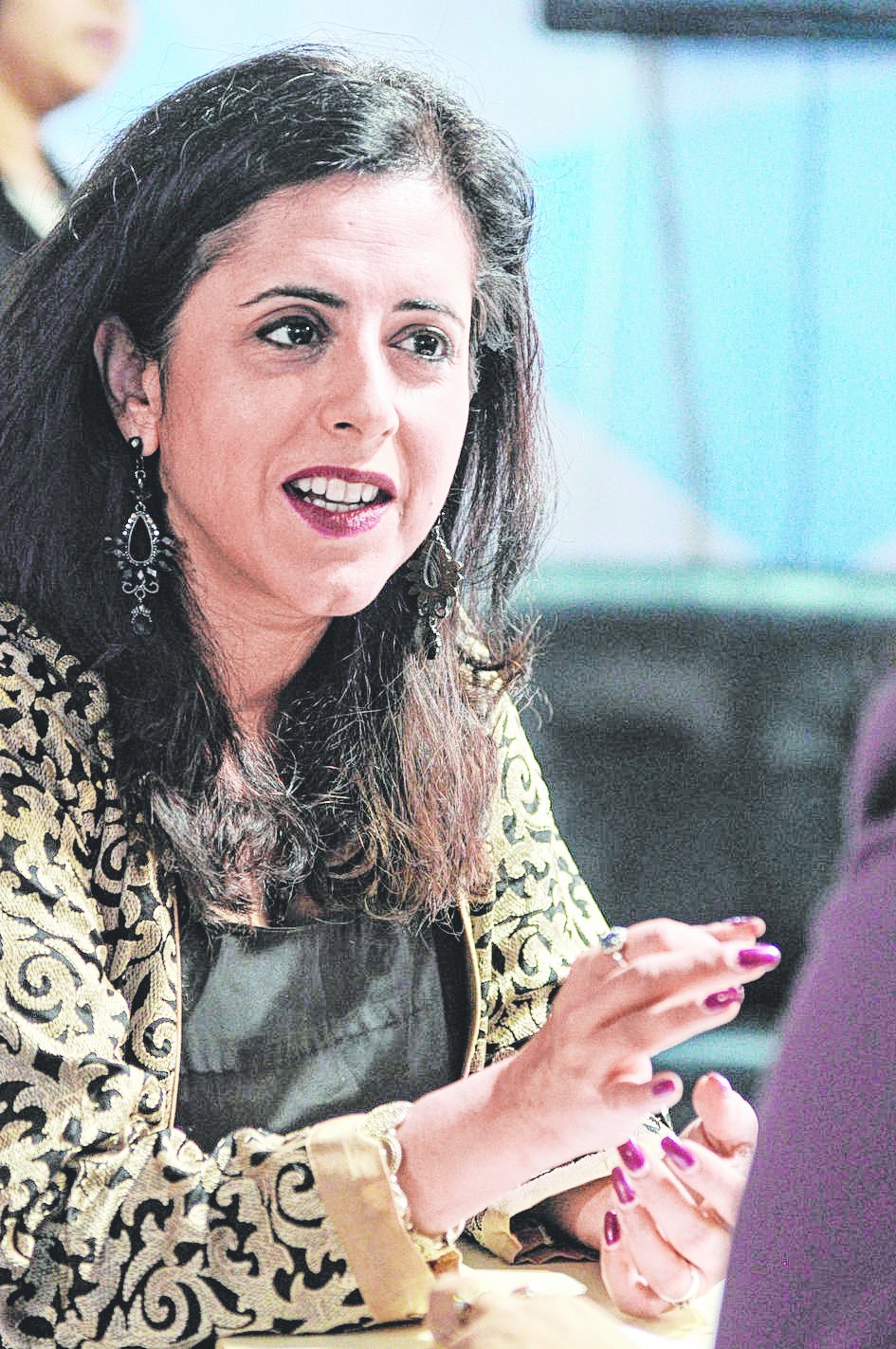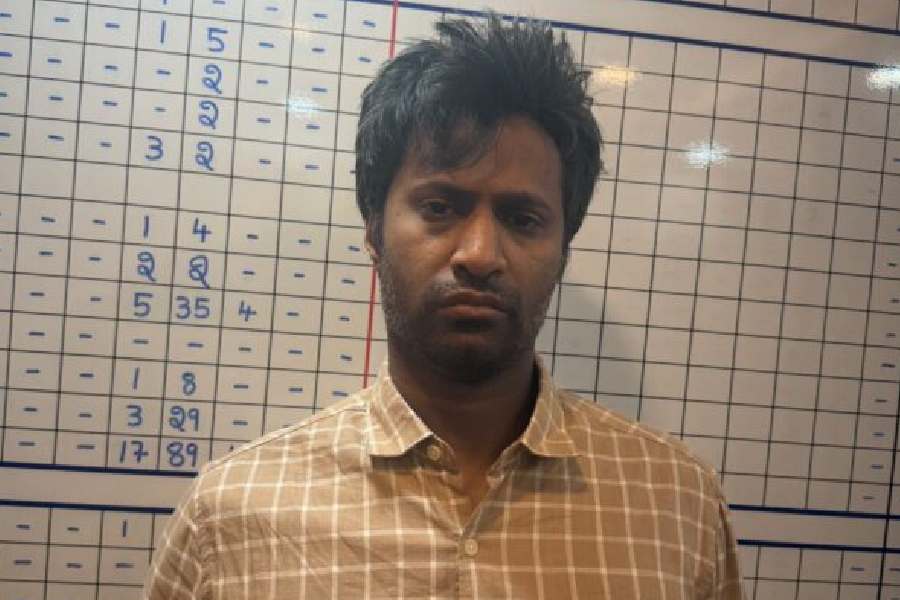UK being the theme country of the Calcutta Book Fair, several authors from the country were in the city recently. Metro caught up with some of them
Back to roots

She is a busy London-based journalist, a doting mother and a home baker. And if you thought her hands were full, Anita Anand proves you wrong.
While on maternity leave around four years ago, she came across a magazine feature on princess Sophia Duleep Singh, daughter of Maharaja Duleep Singh and granddaughter of Maharaja Ranjit Singh. The article made little sense to Anita but the picture of the beautiful revolutionary princess fired her curiosity. A lot of research and some travel later, she was ready with her first historical non-fiction, Sophia: Princess, Suffragette Revolutionary.
Sitting at the UK pavilion at Milan Mela, after an interactive session on her book, Anita was soaking in the local flavour of the fair. "Jaipur (Literature Festival) was very hectic... Calcutta seems more relaxed. I am enjoying the easy pace but Calcutta is definitely a cauldron of creativity," said the England-born Punjabi, visiting Calcutta for the first time.
Though Anita has lived in England all her life, she is fluent in Hindi. "I visit India almost every year. In some ways I could identify with the central character of my book. She was also brought up in England but was connected to her roots in Punjab. Princess Sophia's life was very privileged. She enjoyed the best of luxuries, was the goddaughter of Queen Victoria. Yet she decided to go beyond her glass palace and fight for women's rights and suffrage. She was very stubborn too, like me," smiled Anita.
She went on to narrate how writing the book was one of the most delightful experiences of her life. "As I embarked on the research, I got an interesting picture of India and Britain in the colonial era. My canvas was enormous and the work absolutely engrossing. Writing a book turned out to be far more difficult than writing news stories. Yet it was so much fun."
With her book having several references to Calcutta, Anand was eager to explore the city. "I loved touring the city and feasting my eyes on the colonial leftovers. So many places in Calcutta reminded me of London."
Tricks of translation

The stuff of literary translations can be a slow, meandering business.These meanderings consist in conversations, off and on, but also requiring periods of intense gestation of ideas. The act of translation transports not just words and phrases but also transplants gestures in another language, sometimes another medium.
The Book Fair, with the UK as its theme country, served as the lightning rod for many such conversations which got assimilated into one complex narrative with Alexandra Büchler, director of Literature Across Frontiers (LAF), speaking with Sampurna Chatterjee from India and Bill Herbert from Scotland, poets and translators both, on the messy business of literary translations.
Three broad themes emerged from the conversation whose references oscillated between Dundee and Meena Kandasamy's poem Mulligatawny dreams and everything in between: translation as conversation, translation as destination and translation and multilingualism.
The importance of conversations and collaboration with the author during the process of literary translation was a theme that all three participants kept coming back to. Bill recalled his conversations with Joy Goswami more than 15 years ago, during his first trip to India, speaking to the Bengali poet about "waiting for the poem" to arrive and then being able to access Joy's poems in more depth through Sampurna's English translations.
Drawing on the duality of her identity as a creative writer and translator, Sampurna spoke about how, as a writer, she sometimes felt desolate, alone and disoriented in the process of creation whereas translation has the comforting presence of another person, however, remote or spectral, as a guide and the original text as a road map.
Bill extended this translation as travel metaphor by talking of it as a journey to a "third shore" where the port of departure for a translator was the mother tongue and the text to be translated the second shore. The final product of literary translation was the mythical "third shore" where one arrived unplanned, through uncharted waters.
Alexandra, who had earlier introduced the work of LAF in India, talked about the ping-pong of languages in the process of translation when the fixed ideas of the source and target languages start to fray around the edges and eventually mesh into each other.
Speaking of English as an international bridge language for translation, Bill flagged up the need to recognise that there were many Englishes, and not one definitive English. Pointing at Shakespeare peering out of a handsome mug from the Literature is Great campaign, Bill said: "The Englishes of Robert Burns and Shakespeare are different."
So where does all of this leave Google Translate? "Most translation is cultural in nature and algorithms don't do that," the panel concluded. Well, not yet anyway.
Writer of many parts
.jpg)
He went to Bulgaria to research for his book, The Descent of the Lyre but was chased away by the monks at the Bachkovo Monastery before a round of drinks with an elderly Bulgarian lady left him inspired.
"And that's how my book happened based on these human conversations," recounted British novelist Will Buckingham, at the launch of the paperback edition of his book.
If Will had been nervous about how the Bulgarian translation of his book would be received, he was relieved by the warm response.
"This book had two parallel stories. One plan failed and failed in an interesting way, so that I could base my book on it," said the author, whose ouvre spans across Buddhism and philosophy to fiction and children's stories.
As a writer, Will claims to be suffering from an identity crisis. "I have done a picture book for children, my next book is going to be based on French philosophy, I have many identities as an author. But that didn't bother me as it did others. Books are a one-off thing. I have written 64 stories on Chinese text, my forthcoming novel Goat Music is a retelling of the Greek myth of Apollo. My travel to Bodh Gaya is to write on the journey of Hsuan-tsang. It all hangs in together somehow," said the author.
Narrating his own story of becoming an author, he went back to the days when he was training to be an anthropologist doing field work in Indonesia in 1994-95. "I was living on an island, speaking Indonesian. This was a time before the Internet and so there was little conversation with my folks back home. I missed writing English and so one day I sat down and wrote a story. Someone read it and was choked with emotion. It was then that I decided to become a storyteller," he signed off.
Sarah the storyteller

Some stories are best enjoyed when heard. English storyteller Sarah Rundle's tales were just that, simple, and at times poignant, but always entertaining. The professional storyteller-actor narrated five stories at a packed UK pavilion of the Book Fair.
Sarah started off with an impromptu poll. "Do you want stories about good children or bad children?" she asked the young ones. With a 50:50 verdict, Sarah opted for a mixed bag. On her invitation, the kids huddled together on the podium ground, ready to parrot the lines and sounds she taught them.
First up was a Chinese folktale of two naughty boys, followed by a British story on stupidity and another about a silly farm hand who gets a rich bride.
"The kids here were very good listeners! Very keen and eager, I like that," she said. "I noticed a difference between the UK and Indian audience. Maybe your tradition of respect for living creatures just makes you.... nicer people, in India. One of the things that stories can do is prepare children for the fact that life can be hard, not in a way that brutalises the children, or makes them think cruelty is normal, but in a way that enables them to meet life's difficulties."
Pictures by Arnab Mondal, Sanat Kr. Sinha and Anindya Shankar Ray











